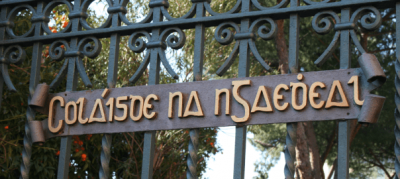
By Cian Molloy - 14 June, 2020
The Pontifical Irish College in Rome will not be receiving any Irish seminarians this year, following a decision by the

The gates of the Irish College in Rome
college trustees.
The decision was taken partly as a result of the COVID-19 pandemic, which hit Italy particularly hard, and also because the Vatican’s new Ratio for Seminary Formation, published by the Congregation for the Clergy four years ago, sets out new norms for the formation of priests.
These norms now require students to undergo a ‘propaedeutic period’ of at least a year to help discern if they truly have a vocation to the priesthood before their studies begin in earnest. It also requires college authorities to take greater care in screening candidates for the priesthood to ensure that they are not a danger to children or vulnerable adults.
Nevertheless, the college’s acting rector, Fr Paul Finnerty has told the Irish Bishops Conference that the college, which was founded in 1628, will continue to be a place for the formation of priests. This includes facilitating clergy who are pursuing postgraduate studies in Rome or visiting the Eternal City as part of a period of sabbatical renewal.
At present the college, known in Irish as Coláiste na nGael, hosts a semester abroad programme for seminarians from the United States and this is likely to continue. This is believed to be the first time in nearly four centuries that the Irish College in Rome has not accepted Irish seminarians.
In response to Fr Finnerty’s announcement, the Irish Bishops Conference has said that they are considering how priests should be prepared with “the human, spiritual, theological and pastoral aptitudes needed to address the challenges of contemporary Ireland” and in keeping with the Vatican’s Ratio for Seminary Formation.
Following the Irish Episcopal Conference’s online virtual summer meeting last week, the bishops acknowledged the college’s commitment to explore new ways in which it can be of service to the church in Ireland.
This will include both its historical ministry of priestly formation – initial and ongoing, they said in a joint statement. They also said that they and the college trustees need to consider how the institution in Rome can contribute to formation for new forms of ministry in Ireland, which are needed because of the growing shortage of priests. These ministries include the permanent diaconate, parish catechists and parish pastoral workers.
The bishops, many of whom have stayed at the college or even studied there, said: “The broad, global, and universal viewpoint offered by a Roman experience has been enriching for many down through the centuries. This remains true today, and into the future.”